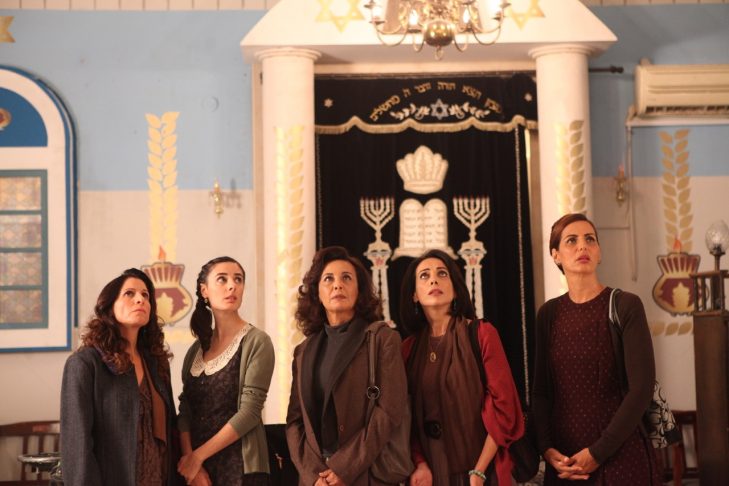In a cozy corner of Jerusalem, members of a small Mizrahi synagogue are about to celebrate a bar mitzvah. The atmosphere is playful and festive as the family, led by proud grandparents Ettie and Zion, lead a merry band of celebrants to the synagogue. As tradition dictates, once this group arrives the women retire to their balcony to look down and even supervise the men praying below. But just as the bar mitzvah is about to begin, the balcony suddenly collapses, severely injuring the wife of the rabbi. The elderly rabbi is unable to cope with the disaster and the congregation is effectively homeless. After the accident, Zion and his eccentric group of friends struggle to recruit the requisite 10 men to pray publicly in another space.
That is the premise of “The Women’s Balcony,” a delightful, warm comedy that was a surprise hit in Israel. But don’t be fooled by some of the film’s madcap elements. Like a photograph developing in a darkroom, the movie reveals its complexity gradually. Contributing to that complexity is the unspoken clash of cultures—clashes that eventually come to light in the film—among the neighborhood’s Orthodox communities.
A young, charismatic ultra-Orthodox rabbi comes to the rescue of Zion and friends when he taps into his endless supply of seminary students to make a minyan, a prayer quorum. Soon enough the Mizrahi congregation comes under the influence of Rabbi David, who delivers fiery sermons about modesty and strict religious observance. While he captivates the men, the women are not as impressed with this interloper, who says they must cover their hair and dress more modestly. He further alienates Ettie and her friends when he implies that their sins might have caused the accident.
Things come to a head when Rabbi David takes it upon himself to supervise the repairs to the synagogue. When it finally reopens, the women are shocked to see that their bright, airy balcony has been eliminated. Ettie and her friends are irate that they have been relegated to a small, claustrophobic space. They ban together to raise funds to rebuild their beloved balcony, but Rabbi David unilaterally decides that their money should pay for a new Torah scroll. His decision motivates the women to protest outside his seminary. After a number of twists and turns—including a nod to “Lysistrata”—love prevails.
Screenwriter Shlomit Nechama has said that her aim was “to tell the story of moderate people who are forced to deal with growing religious extremism.” “The Women’s Balcony” does that and more, showing a group of people who delight in traditional ritual without succumbing to joyless observance.

Rama Burshtein’s second feature, “The Wedding Plan,” is an intricately, deftly paced film whose heart belongs to 32-year-old Michal, whose fiancé has left her at the altar. Michal, who is ultra-Orthodox, is anything but a stereotype. As played by Noa Koler, who won an Israeli Academy Award for her performance, Michal’s inner conflicts and self-doubts are on full display. But so are her bravery, faith and longing for true love. As Burshtein, who is Israeli and ultra-Orthodox, so cleverly sets up, the hall is paid for and the wedding gown is ready—all that’s left for Michal to do is wait for God to provide another bridegroom within 22 days.
Michal is an anomaly in her chosen community. She baffles her matchmaker and challenges her suitors, all of whom are Breslov Hasidim. They wear big hats, austere suits and side curls, unsure of what to make of a potential wife who runs a mobile petting zoo. It’s tempting to write off Michal’s romantic adventures as a bumbling, chaste version of JSwipe or Tinder, but the talented Burshtein steps it up by showing the inner workings of Michal’s complicated world.
For all its zaniness, “The Wedding Plan” is a deep, substantial film. At one point one of Michal’s love interests is a secular Israeli pop star whom she meets in Ukraine at the grave of Rabbi Nachman. The popular singer has come there out of curiosity. Michal makes it clear that she has made the pilgrimage to petition the 18th-century founder of Breslov Hasidism for a happy ending. Michal’s dilemma and her religious observance intrigue her potential suitor. But Michal is no pushover. Burshtein has them toying and flirting with each other. The pop star is just as vulnerable to love as Michal.
Michal invites comparisons to strong, resolute single women from both pop culture and serious literature. Think of Mary Richards, Bridget Jones and Jane Austen’s Elizabeth Bennett. But unlike her foremothers, Michal’s search for true love has a contemplative, even brooding, undercurrent that doesn’t suggest a neat, conventional ending. After all is said and done, Burshtein has gifted audiences with a mystical fairytale and a protagonist whose faith and resilience inspire long after the film has ended.
“The Women’s Balcony” opens on July 7 at West Newton Cinema. “The Wedding Plan” is now playing in area theaters.
This post has been contributed by a third party. The opinions, facts and any media content are presented solely by the author, and JewishBoston assumes no responsibility for them. Want to add your voice to the conversation? Publish your own post here. MORE



